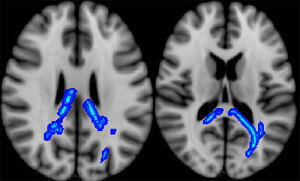por
Lauren Dubinsky, Senior Reporter | March 30, 2016
A magnetic resonance technique called diffusion tensor imaging (DTI) might be able to predict future outcomes for veterans who experienced mild traumatic brain injuries (MTBI) during combat. A study detailing the research was recently published in the journal Radiology.
"Outcome prediction in this population is important because identifying those most at risk of poor outcome may allow for more effective targeting of rehabilitation efforts," Dr. Jeffrey B. Ware, one of the researchers, told HCB News. "With more research, outcome prediction may also be able to shed light on which particular interventions would be most helpful in specific patients."
MTBI has historically been difficult to assess because of challenges of establishing the diagnosis, predicting outcomes and differentiating the effects of it from other conditions like post-traumatic stress disorder. However, DTI may be able to make that process simpler.



Ad Statistics
Times Displayed: 60070
Times Visited: 5271 MIT labs, experts in Multi-Vendor component level repair of: MRI Coils, RF amplifiers, Gradient Amplifiers Contrast Media Injectors. System repairs, sub-assembly repairs, component level repairs, refurbish/calibrate. info@mitlabsusa.com/+1 (305) 470-8013
The technique works by measuring water movement in the brain, especially in the white matter, to detect any abnormalities. Past studies have found a correlation between DTI measurements and neurocognitive function and short-term functional outcomes in certain groups of patients.
"Diffusion tensor imaging is able to assess the microstructural integrity of the brain's white matter," said Ware. "Loss of microsctructural integrity, which may occur through trauma or other processes, may account for the differences in outcomes observed in this study."
Researchers at the Philadelphia VA Medical Center used DTI to evaluate 57 veterans who were clinically diagnosed with MTBI when they returned from deployment. The average period of time between their injuries and post-deployment evaluation was 3.8 years, and the average follow-up duration was 1.4 years.
They found that initial post-deployment DTI measurements, neurobehavioral symptoms, timing of injury, and subsequent functional outcomes were all linked. They also found that the measurements were associated with greater health care utilization among veterans with MTBI.

